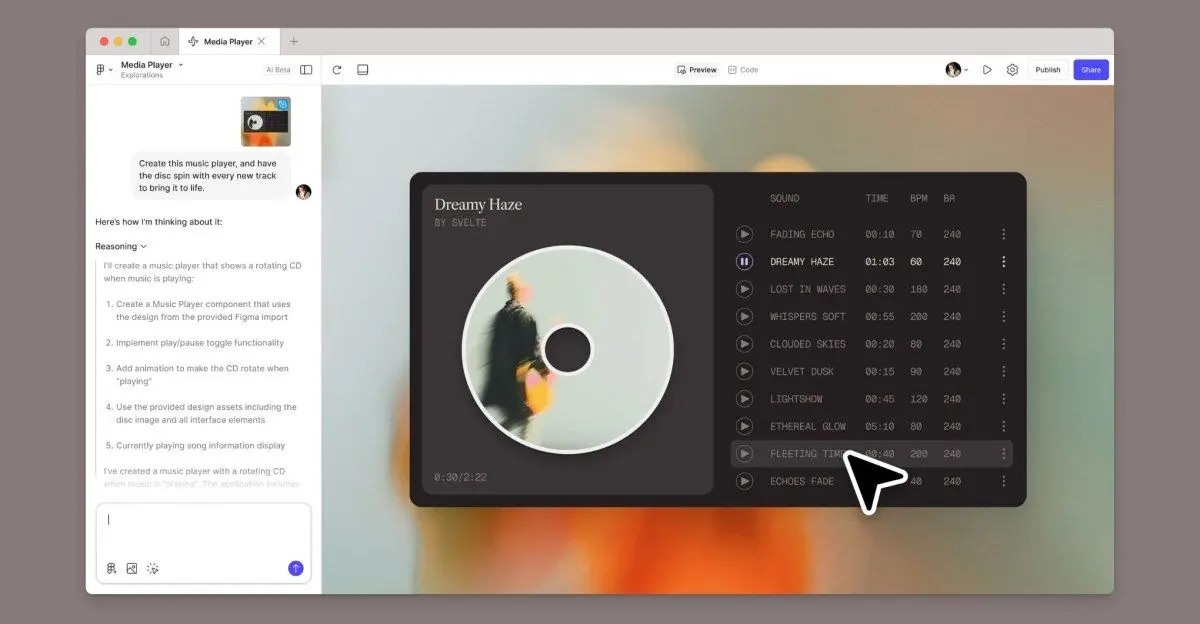Figma Enhances AI Integration with Expanded Model Context Protocol
2 Sources
2 Sources
[1]
Figma made its design tools more accessible to AI agents
Figma is launching some new updates that allow AI models to directly communicate with its app-building tool and access designs remotely. Figma's Model Context Protocol (MCP) server -- a bridge that enables AI models to tap directly into the code behind prototypes and designs created using Figma's tools -- has now been expanded to support the design platform's AI prompt-to-app coding tool, Figma Make. "By using a Figma Make file via an MCP client, AI models can see the underlying code instead of a rendered prototype or image," Figma's technology chief, Kris Rasmussen, said in the announcement blog. "The Figma MCP server indexes the code in your Make file so you and your favorite platforms can request exactly what's needed." In simple terms, this means the MCP server can show AI models and agents exactly how an app was built in Figma Make, so it can be accurately recreated instead of guessing based on the visual design. Figma says the Make MCP server experience supports products from Anthropic, Cursor, Windsurf, and VS Code starting today, and that future updates will allow third-party MCP servers to connect with Figma Make. The MCP server can now be accessed remotely from AI coding agents, browser-based models, and integrated development environments, making the tool more accessible for developers who were previously tied to needing local access to Figma's desktop app. Some upcoming Figma features include a Design Snapshot feature that converts Make snapshots into editable layers in Figma Design, which is expected to launch this week, and an editing feature that allows users to manipulate designs with AI prompts without leaving the Design tool canvas, which is currently in testing.
[2]
Figma is making its AI agents smarter and more connected to help boost your designs
REST API rate limits will change, but only 1% of users will be affected Figma is rolling out behind-the-scenes upgrades to make its AI agents even more powerful by extending their access to context across more places. Following on from the launch of the local MCP server earlier in 2025, Figma is adding remote access to Figma MCP, allowing users to connect to the platform from IDEs, AI coding agents and browser-based models. The company has also launched a partner catalog to simplify connecting the MCP server to IDEs or agents. Figma is also using its Model Context Protocol (MCP) - an open-source standard for connecting AI tools with software applications, tools and platforms - right inside Figma Make to provide a bridge between users' projects and their codebases. It enables AI models to access the underlying code from Make files, not just the rendered prototypes or images, and will be supported in Anthropic, Cursor, Windsurf and VS Code from launch, with indications that further partners could join at a later date. Figma Make was launched at Config 2025 in May as a prompt-to-code tool to turn natural language input into fully coded protoypes. Looking ahead, Figma says it will review all public third-party integrations and MCP clients before they can access user data to ensure maximum security. REST API rate limits will also be adjusted from November 17, but Figma says the change will only affect less than 1% of Figma's active users. "We want context to move freely between tools so that explorations can evolve into production features, without unnecessary rewrites or modification," Figma CTO Kris Rasmussen added. Figma has also added in-app mapping within Code Connect, and the MCP server promises to share more than just design context, such as code component locations and usage guidelines. The changes are available now, but Figma noted that they remain in beta.
Share
Share
Copy Link
Figma launches updates to its Model Context Protocol (MCP) server, enabling AI models to directly access and interpret code from Figma Make files. This enhancement aims to improve AI-assisted design and app development processes.

Figma's AI Integration Leap
Figma, a leading design platform, has announced significant updates to its Model Context Protocol (MCP) server, marking a substantial advancement in AI integration within the design and app development process
1
. The expanded MCP server now supports Figma Make, the company's AI prompt-to-app coding tool, enabling AI models to directly communicate with and access designs remotely1
.Enhanced AI Access to Design Code
The core of this update lies in the MCP server's ability to provide AI models with access to the underlying code of designs created in Figma Make, rather than just rendered prototypes or images. Kris Rasmussen, Figma's technology chief, explained, "By using a Figma Make file via an MCP client, AI models can see the underlying code instead of a rendered prototype or image"
1
. This advancement allows for more accurate recreation of designs by AI models, as they can now understand the exact structure and components used in the app's construction.Expanded Compatibility and Remote Access
Figma's latest update extends the reach of its MCP server beyond local access. The server can now be accessed remotely from AI coding agents, browser-based models, and integrated development environments (IDEs)
2
. This expansion makes the tool more accessible to developers who previously required local access to Figma's desktop app. The Make MCP server experience currently supports products from Anthropic, Cursor, Windsurf, and VS Code, with plans for future updates to allow third-party MCP servers to connect with Figma Make1
2
.Related Stories
Future Developments and Security Measures
Figma has outlined several upcoming features to further enhance its AI capabilities. These include a Design Snapshot feature that converts Make snapshots into editable layers in Figma Design, expected to launch soon, and an editing feature allowing users to manipulate designs with AI prompts directly within the Design tool canvas
1
. To ensure security, Figma plans to review all public third-party integrations and MCP clients before granting access to user data2
.Impact on Design Workflow
These updates represent a significant step towards seamless integration of AI in the design process. As Rasmussen stated, "We want context to move freely between tools so that explorations can evolve into production features, without unnecessary rewrites or modification"
2
. By providing AI models with direct access to code and expanding compatibility across various platforms, Figma aims to streamline the transition from design concepts to fully realized applications, potentially revolutionizing the workflow for designers and developers alike.References
Summarized by
Navi
Related Stories
Figma Democratizes App Development with AI-Powered Tool Now Available to All Users
25 Jul 2025•Technology

Figma Unveils AI-Powered Tools for Web Design, Prototyping, and Marketing
08 May 2025•Technology

Figma partners with Anthropic on Code to Canvas as stock plunges 85% amid AI disruption fears
17 Feb 2026•Technology

Recent Highlights
1
OpenAI secures $110 billion funding round from Amazon, Nvidia, and SoftBank at $730B valuation
Business and Economy

2
Samsung unveils Galaxy S26 lineup with Privacy Display tech and expanded AI capabilities
Technology

3
Anthropic faces Pentagon ultimatum over AI use in mass surveillance and autonomous weapons
Policy and Regulation





